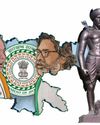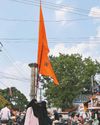An Australian perspective on strategic developments in the Indo-Pacific.

THE curse that ‘may you live in interesting times’ hit with a vengeance in 2016. From the unexpected result of the Brexit referendum to different manifestations of a global rise of populism as reflected in the elections in the Philippines and the US and the continuing turmoil over free trade agreements, managing the geostrategic environment is becoming increasingly challenging for a medium power like Australia. The future of China and its coercive behaviour in the South China Sea provide more uncertainty as Australia seeks to balance close economic relations with the Middle Kingdom and its alliance with the US.
Perhaps the greatest immediate concern for Australia will be the Trump administration’s unpredictability, given the President-elect’s predilection for ‘one-liners’, whether in interviews, speeches, or tweets. As has already been demonstrated in the phone call between the President of Taiwan and Mr Trump, it will not always be easy to distinguish between naivety, opportunism and well-considered policy.
However good its intent, much of what Australia can achieve will be constrained by the financial situation, both global and local. The country itself is faced with the need to reshape the national economy after the end of the boom in the market for natural resources that had been driven greatly by China’s rapid growth. Whether that reshaping will work depends as much on external developments as internal effort and Australia will have to work hard to ensure that the benefits of international free trade are not eroded in the interest of protectionism. This is not something wholly new in Australia’s relationship with the United States. Although such voices will be loud in the new administration, the US has always had a strong protectionist element, most notably in agriculture.
Denne historien er fra January 16, 2017-utgaven av Outlook.
Start din 7-dagers gratis prøveperiode på Magzter GOLD for å få tilgang til tusenvis av utvalgte premiumhistorier og 9000+ magasiner og aviser.
Allerede abonnent ? Logg på
Denne historien er fra January 16, 2017-utgaven av Outlook.
Start din 7-dagers gratis prøveperiode på Magzter GOLD for å få tilgang til tusenvis av utvalgte premiumhistorier og 9000+ magasiner og aviser.
Allerede abonnent? Logg på

Trump's White House 'Waapsi'
Donald Trump's victory in the US presidential election may very well mean an end to democracy in the near future

IMT Ghaziabad hosted its Annual Convocation Ceremony for the Class of 2024
Shri Suresh Narayanan, Chairman Managing Director of Nestlé India Limited, congratulated and motivated graduates at IMT Ghaziabad's Convocation 2024

Identity and 'Infiltrators'
The Jharkhand Assembly election has emerged as a high-stakes political contest, with the battle for power intensifying between key players in the state.

Beyond Deadlines
Bibek Debroy could engage with even those who were not aligned with his politics or economics

Portraying Absence
Exhibits at a group art show in Kolkata examine existence in the absence

Of Rivers, Jungles and Mountains
In Adivasi poetry, everything breathes, everything is alive and nothing is inferior to humans

Hemant Versus Himanta
Himanta Biswa Sarma brings his hate bandwagon to Jharkhand to rattle Hemant Soren’s tribal identity politics

A Smouldering Wasteland
As Jharkhand goes to the polls, people living in and around Jharia coalfield have just one request for the administration—a life free from smoke, fear and danger for their children

Search for a Narrative
By demanding a separate Sarna Code for the tribals, Hemant Soren has offered the larger issue of tribal identity before the voters

The Historic Bonhomie
While the BJP Is trying to invoke the trope of Bangladeshi infiltrators”, the ground reality paints a different picture pertaining to the historical significance of Muslim-Adivasi camaraderie